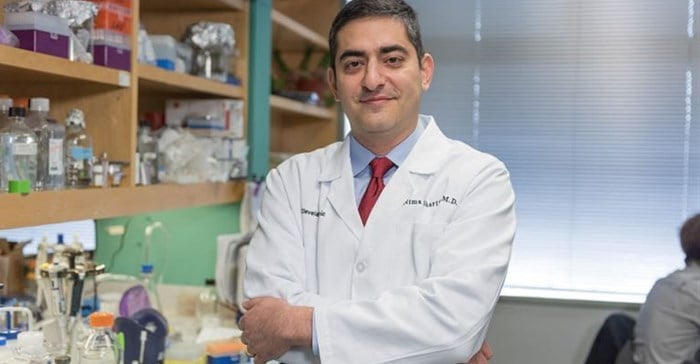New research out of the United States points to a genetic anomaly in certain men with prostate cancer, which may impact their response to common drugs used to treat the disease.

Dr Nima Sharifi
Researchers found that abiraterone, a common prostate cancer drug, yields high levels of a testosterone-like byproduct in men with advanced disease who have a specific genetic variant.
The study’s lead researcher, Dr Nima Sharifi, who is based at Cleveland Clinic’s Lerner Research Institute, previously discovered that men with aggressive prostate cancer who have a specific variant in the HSD3B1 gene have poorer outcomes than patients without the variant. HSD3B1 encodes an enzyme that allows cancer cells to use adrenal androgens for fuel. This enzyme is overactive in patients with the variant HSD3B1(1245C).
Sharifi and his team in the Department of Cancer Biology, including first author, Dr Mohammad Alyamani, found that men with the genetic anomaly metabolise abiraterone differently than men without the variant.
Tailoring cancer treatments
“We are hopeful these finding will lead to us being able to better tailor prostate cancer treatments based on a patient’s specific genetic make-up. More studies are needed, but we have strong evidence that HSD3B1 status affects abiraterone metabolism and probably its effectiveness. If confirmed, we hope to identify an effective alternative drug that might be more effective in men with this genetic anomaly," said Sharifi
Traditional therapy for advanced prostate cancer – called androgen deprivation therapy (ADT) – blocks cells’ supply of androgens (male hormones), which they use to grow and spread. While ADT is successful early on, cancer cells grow resistant, allowing the disease to progress to a lethal phase called castration-resistant prostate cancer (CRPC). In CRPC, cancer cells utilise an alternative source of androgens produced in the adrenal glands. Abiraterone blocks these adrenal androgens.
In the study, the researchers examined small molecule byproducts of abiraterone in several groups of men with CRPC and found that patients with the gene variant had high levels of a metabolite called 5α-abiraterone. The metabolite tricks androgen receptors into turning on dangerous pro-cancer pathways. Remarkably, this byproduct of abiraterone – which is designed to block androgens – may behave like an androgen and cause prostate cancer cells to grow. Investigating abiraterone’s impact on clinical outcomes in CRPC patients will be an important next step.

















































